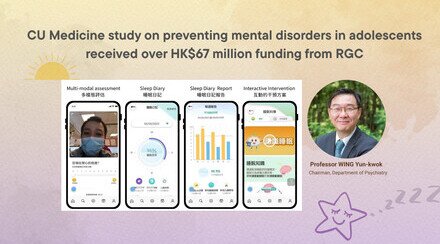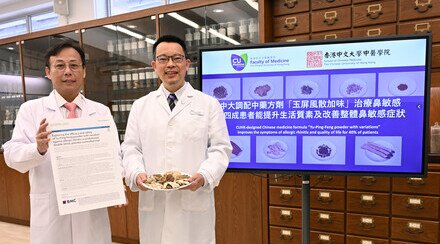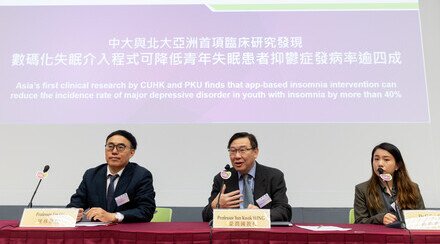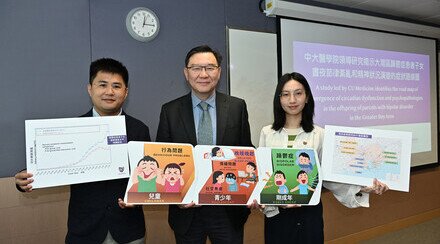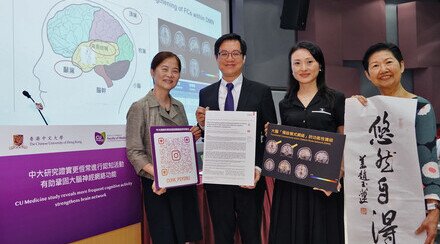CUHK Research Indicates Acupuncture can Improve Cognitive Functions of Elderly - More Elderly Participants to be Recruited for Further Investigation
The School of Chinese Medicine and the Department of Psychiatry of The Chinese University of Hong Kong (CUHK) jointly launched a pilot clinical research project in 2013 to study the efficacy of acupuncture in treating mild cognitive impairment (MCI). Preliminary findings suggest that acupuncture can help improve the cognitive functions of the elderly and reduce the risk of dementia development.
MCI refers to the onset and evolution of cognitive impairment with memory loss being one of the commonest syndromes often found in the elderly. Although the symptoms at early stage are usually not significant enough to interfere daily life of the sufferers, MCI tends to progress to dementia, resulting in decline in cognitive and intellectual function such as memory, comprehension, the ability to communicate, calculate and make judgement, and even changes in mood and behavior. According to epidemiological studies, 8.5% of the Hong Kong population aged 70 or above suffers from MCI. Since there is currently no effective cure for dementia, medical professionals have been advocating early intervention to prevent the progression of MCI to dementia, and to relieve the burden the disease places on patients’ family and society.

Prof. Albert Leung (middle), Director, School of Chinese Medicine, CUHK; Prof. Linda Lam (right), Chairman, Department of Psychiatry, CUHK and Mr. Tung Chi Fat, MH (left), Executive Director, the Neighbourhood Advice-Action Council introduce the clinical research on the efficacy of acupuncture in the treatment of mild cognitive impairment.
In the conventional treatment of memory related diseases, Chinese medicine practitioners advocate the regulation of brain functions and tonification of the kidney. As suggested by the Chinese medicine classics, stimulation of certain acupuncture points can strengthen cognitive functions. To ascertain and quantify the efficacy of acupuncture in the prevention and treatment of MCI, the CUHK School of Chinese Medicine and the Department of Psychiatry have jointly launched a pilot clinical research project since August 2013 by using a widely recognized measurement scale and questionnaires, such as Cantonese version of the Mini-Mental State Examination (CMMSE) and Alzheimer's Disease Assessment Scale-cognitive subscale (ADAS-cog).
A total of 7 subjects aged between 65 and 79 and diagnosed with MCI were recruited in the first phase of the research project. They were given acupuncture treatments at acupuncture points such as GV20 (Baihui), GB20 (Fengchi), EX-HN1 (Sishenchong), KI3 (Taixi) and etc. Upon completion of the 24 acupuncture treatments throughout the 8-week programme, the cognitive functions and memory of these subjects were proven to be enhanced. Professor Albert Leung, Director, School of Chinese Medicine, CUHK said, ‘We are delighted to see that acupuncture treatments help improve the cognitive functions of the elderly. We shall further ascertain its efficacy through our pilot clinical research project. We would like to extend our deepest gratitude to the Health and Medical Research Fund of the HKSAR Food and Health Bureau for funding the project and the Neighbourhood Advice-Action Council for recruiting eligible participants from their day care centres.’
The School of Chinese Medicine is now recruiting more elderly participants aged 65 or above with MCI for the second phase of the pilot clinical research project. Free assessment and acupuncture treatments will be provided to eligible participants. Interested parties are welcome to contact the CUHK research team by phone at 3943-1231 / 6112-0106 or the Neighbourhood Advice-Action Council at 2466-6591 for registration or enquiry.
_1568878086.jpg)
A group photo of the speakers and students from the School of Chinese Medicine, CUHK.
.jpg)
Students from School of Chinese Medicine, CUHK demonstrate massage of acupuncture points that improve memory.


